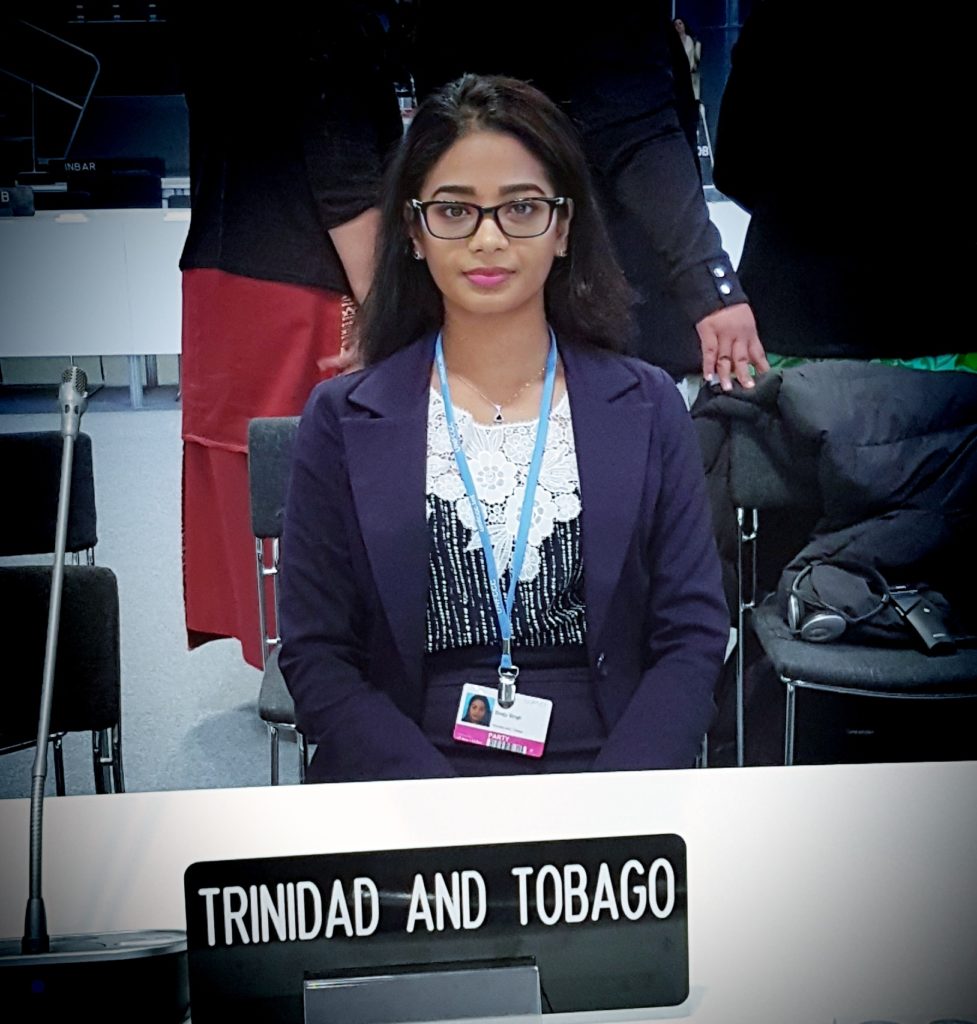Sindy Singh graduated with a Bachelor in Environmental Studies (Honours) and a Certificate in Geographic Information Systems and Remote Sensing in 2009 and a Master in Environmental Studies and Diploma in Environmental Education in 2013. In both instances, as an international student from Trinidad and Tobago.
Where do you work and what do you do?
I am currently Climate Change Specialist at the Multilateral Environmental Agreements Unit, Environmental Policy and Planning Division, Ministry of Planning and Development in Trinidad and Tobago. My responsibilities include coordination of the implementation of the National Climate Change Policy as well as ensuring the country’s international commitments as it relates to climate change are met. I also provide relevant support for sustainable national development.
Part of my work includes the oversight and coordination of several large multilateral donor funded projects which is exciting because I get to work with people of all walks of life from so many different places of the world. I also currently attend international climate negotiations for my country and serve as the coordinator for adaptation issues for the Alliance of Small Island States.
Tell us your work journey after the degree: what went well? What was challenging? How did you use what you learned?
My journey was a bit simple. I was a scholarship student from my Government to York University so upon finishing my Bachelors degree, I returned home for a period of obligatory service. I was placed in the Environmental Policy and Planning Division to gain work experience and as they say, the rest is history!
After completing one year there, my manager was quite pleased and offered me another year. Then, I secured another Government Scholarship and returned to York U to complete a Master in Environmental Studies in 2013. York U was again my choice because of the flexibility to create my plan of study under the MES Programme.
Again, I returned to Trinidad and Tobago upon graduation. I was unemployed for a bit as jobs in the environmental sector locally can be hard. As luck would have it, a position was advertised at the Environmental Policy and Planning Division and I was successful in attaining it. I have since worked my way to the position of Climate Change Specialist…
In terms of challenges, my York degrees provided me with a stable foundation of science and policy understanding, but the world of work was completely different. Government practices had to be learned, networks had to be created and I suppose any job will present such challenges. I use things I learned every day, because I get to dabble in many things related to climate and development policy. One of the most profound things was the concept of systems thinking, I think it applies almost everywhere! I also find the very fundamental things like learning about different worldviews with Peter Timmerman taught me to reflective in my thinking in dealing with different stakeholders. Overall, the very core teachings and interdisciplinary ways of learning and thinking prepared me for the wider world. When did you feel like “I wish that they had taught me about this in university!” One of the truly marvelous things about the Faculty of Environmental Studies (former) was the interdisciplinary nature of its programme. I benefitted from courses from culture to economics to politics! The sky was the literal limit but of course time doesn’t permit one to study everything so, in hindsight, I would’ve focussed a bit more on economics if I had the opportunity. This is important in understanding applying solutions to real world problems.
Thinking back to when you were in high school, what made you want to get into this? How does what you are doing match, and differ, from what you thought?
As a teenager I did not think my life, in terms of career would turn out the way it did (thus far) but I am not disappointed. I wanted to work in the environmental sector doing something related to atmospheric science, and here I am! I was motivated to make a change in the world, even if that world was just my country. I did not have a definite plan but in choosing Environmental Studies, I knew I wanted to be in a job which was involved in making change. It requires more intense and hard work than I imagined and continuous commitment to learning and professional development and understanding of so many linked fields.
I also did not imagine that policy making and development planning would take as long as it does or involve elaborate processes. But in the real world it does! Textbook solutions almost never apply! The work and time requirements are rigorous. In some ways, my expectations have been surpassed, in terms of being able to participate in international climate policy processes and be a voice for my country and my region.
Any other advice for people thinking of an undergrad environmental degree?
Follow your heart! Life is nicer when you are doing what you like/love. Expose yourself to economics, politics, science, geography, anthropology, gender studies and all related fields! Environmental work will require you to understand many topics. You have the opportunity to help chart a more sustainable future for our world, and every little bit counts. Talk to people in careers you might like to get into, and find out how they got there so you may know what steps to take in your own plan, what courses to pursue etc.


